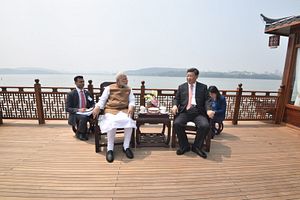Commentators here at The Diplomat and elsewhere have offered extensive analysis on the implications of the recently concluded informal summit between Indian Prime Minister Narendra Modi and Chinese President Xi Jinping in Wuhan, China. As expected, the summit did not produce any eye-popping concessions or set in motion a concrete process of reconciliation between New Delhi and Beijing after a difficult two years in their relationship—a bilateral that has seen its ebbs and flows between cooperation and competition over the years.
One of the relatively underemphasized outcomes of the Wuhan summit is the proposal for joint India-China economic projects in Afghanistan. Writing for The Hindu, Happymon Jacob describes the initiative as a possibly “instrumental in mitigating the trust deficit between the two sides.” The geopolitical incentives for India and China in Afghanistan generally align; Beijing and New Delhi both would welcome a stable and strong central government in Kabul. Even as China maintains its so-called all-weather partnership with Pakistan, where the military has seen the emergence of a strong central government in Kabul as antithetical to its interests, Beijing’s interests in stability—and unlocking Afghanistan’s economic promise—will Trump its commitments to Pakistan.
India, too, has long been an enthusiastic supporter of Afghanistan’s economic promise. In recent years, New Delhi has made considerable progress in supporting Afghanistan’s economic integration with South Asia and the wider western Indian Ocean region. The activation of the India-Afghanistan air corridor, the finalization of a trilateral agreement with Iran over Chabahar port with Kabul, and the Salma Dam project are just a few examples of India’s expanding economic footprint in Afghanistan.
On paper, the idea of Sino-Indian collaboration in Afghanistan has had appeal in India too. In 2017, after a high-level China-India dialogue, former Indian Foreign Secretary S. Jaishankar had noted that “there was an understanding on how India and China can cooperate in capacity building in Afghanistan.” After Wuhan, it appears that both countries continue to have incentives to cooperate in Afghanistan. Even if New Delhi and Beijing collaborate without the expectation that the sum of their efforts together can yield greater benefit to Afghanistan than either of them going it alone, the effort may have positive effects on their bilateral ties elsewhere.
Of course, turning the promise of Sino-Indian collaboration in Afghanistan into reality may prove challenging. As Srinjoy Bose and I explored in a 2016 India Review article, while New Delhi and Beijing have some overlapping geopolitical interest in stability in Afghanistan, their ability to productively pursue cooperation in the country may ultimately be limited by other structural factors. As we highlighted in that article, third parties—especially Pakistan and the United States—will be important players. Washington’s role, in particular, may intensify in coming years as the Trump administration has reversed course on the Obama administration’s withdrawal timetable and the security situation in Afghanistan shows few signs of long-term improvement.
































